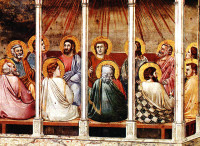Gary Neal Hansen's Blog, page 49
September 3, 2015
Letters to a Young Pastor: Guidance and God’s Character
 CC by Henry Burrows-SA 2.0
CC by Henry Burrows-SA 2.0Dear ______:
Yes, I suppose it does sound like I’m making my theological judgment based on personal taste.
I said that thinking God has a specific plan for each step of your life makes faith feel like a tightrope walk. I admit, it is my own metaphor, rather than something from Scripture.
I do think it would be an unpleasant way to live.
Underneath it all, our understanding of guidance and God’s character go together.
There is more that one way to connect the dots, but it seems like a lot of people think about it like this:
1. God really does have a very specific plan for each and every step of your life—and mine, and everybody else’s.
2. God holds you accountable for following this plan. Take the right path and you are obedient. Take the wrong path, you are disobedient.
If #1 is true then it certainly feels like #2 must be true as well. That’s the tightrope.
For the sake of argument let’s assume 1 and 2 really are true.
The question is what #3 should be.
It is either
3A. God has set it up so that it is hard to find out what each step should be.
or
3B. It is actually easy to find out exactly what God wants you to do each day.
I’d say a whole lot of Christians find that “3A” is true. We listen for guidance, but we don’t know for sure. We pray over a decision and hear no word from on high.
If God has a plan and holds us accountable, but keeps the plan secret it makes God look kind of mean.
The problem is, Scripture says consistently that God is loving, and wise, and good.
But if we say we can easily find each step of God’s plan, is it actually true?
I’d say a whole lot of Christians hold this set of views. It is as easy as perking up your ears to hear God whispering instructions.
God surely can whisper his will to us that way. I’m sure that sometimes he does.
It does look easy for some people. They just listen.
Sometimes, though, to make listening easier the rest of us resort to tricks.
We open the Bible at random hoping for a message.
We try to get God to tip his hand: “If you let X happen I’ll know you want me to do Y.”
We spiritualize whatever happens, saying God opened or closed a door.
Often enough, when we listen for direct guidance, we do hear a voice. The problem is that sometimes the voice is not really God.
The whisper we hear just might be our own feelings.
My fears can imitate the voice of God.
So can my hopes and my desires.
It can bolster my confidence to call a decision “The Will of God” but it might not be true.
I don’t want to confuse my will for the voice of God.
Martin Luther said the phrase “Thy will be done” in the Lord’s Prayer really meant
O Father, do not let me get to the point where my will is done. Break my will; resist it. No matter what happens let my life be governed not by my will, but by yours.[1]
The human ability for self-deception is nearly limitless. I think you’ll be on much firmer ground learning God’s will where God has always sought to teach it to you: in a prayerful reading of the Bible.
God will be speaking whether you take a Reformed approach and study it, or follow St. Ignatius and use the Examen and the Prayer of the Senses.
It is a little bit indirect, and it takes more time and effort, but like when Moses was hidden in the cleft of the rock (Exodus 33:21-23), afterward you’ll know God has been there.
I really will get back to other helpful ways to find clarity about God’s call in your life soon!
Blessings,
Gary
————
Need a way to rekindle your connection to God through Scripture? Let me send you a free copy of my book Love Your Bible: Finding Your Way to the Presence of God with a 12th Century Monk. Just click the button and tell me where to send it.
[1] Martin Luther, “An Exposition of the Lord’s Prayer for Simple Laymen,” Luther’s Works 42: 44-48.
The post Letters to a Young Pastor: Guidance and God’s Character appeared first on Gary Neal Hansen.
September 1, 2015
Anything for Jesus: St. Simeon Stylites
 I’ve always known in my bones that we should celebrate New Year’s Day on September 1.
I’ve always known in my bones that we should celebrate New Year’s Day on September 1.New pencils. Empty notebooks. Fresh eager faces. New classes to take or to teach. That is when it all starts for me.
I’m now very happy to discover that the Orthodox Church had the same idea centuries ago. September 1 is the beginning of the Eastern Church’s year too.
Of course they gave it a fancy name: “The Beginning of the Induction” is one of those Orthodox words for which one needs a secret decoder ring.
By a happy turn of Providence, on the same day the Orthodox also celebrate the life of St. Simeon Stylites (c. 388 – 459).
Okay, Simeon also needs a bit of explanation.
He was born in the 4th century, when becoming a monk was as hip as carrying a new iPhone. (I’m not kidding. Fasting and poverty in the desert or a monastery was huge.)
Simeon was extremely keen on this. His fasting and other ascetic practices were so strict that his monastery politely suggested he leave.
He got creative about it. First he moved into an old dry well. Then for a while he lived in a cave. But it seems that withdrawing from the world wasn’t exactly what Simeon wanted.
He thought up a completely new way to be a monk: he built a sort of pillar six or eight feet tall, with a little hut on top of it, and he moved in.
Over time he built it up taller and taller. Eventually it was somewhere between fifty and eighty feet tall.
He lived up there for thirty-seven years.
Thirty-seven years on top of a pillar.
I kid you not.
I’ve taught about him for long enough to have a pretty good sense of what you are thinking.
What kind of whackdoodle Christianity is it to live on top of a pillar for well over three decades?
You are probably thinking
How could that possibly express the love of God? Shouldn’t he have been loving his neighbor?
I hope that the fact that the Church considers him a saint will at least prompt you to ask
What was he doing up there all that time?
Thirty-seven years of devotion to Jesus
It was, you might say, a simple lifestyle:
Praying.
Fasting.
Serving.
Fasting and praying may not surprise you—though you would be surprised if I told you how much of either that he did.
What might be surprising is that he spent his time serving and loving people.
How, you might ask, could he serve anybody on top of that pillar?
Well, he made himself a bit of a public attraction. People were curious. They came by. They asked questions.
Every afternoon he came out to talk with people. Huge numbers of people. Every single day.
He counseled and advised.
He helped people settle their disputes and heal broken relationships.
Pagans were so impressed with his life that they were converted to Christianity.
This guy on the pillar was no joke. Emperors listened to his advice.
I’d say that all his time invested in prayer was a life well invested. God answered. God used Simeon.
In our culture Christians want to blend in. We say we don’t want to offend people with our faith, but sometimes we just are afraid of looking different.
Here’s the thing: St. Simeion Stylites would do anything for Jesus.
If a life devoted to prayer and serving others means looking different, then just be different.
Meanwhile I think I won’t criticize St. Simeon Stylites until heads of state want my counsel. Or until my witness to Christ converts some pagans. Or both. For several decades.
————
I’d love to hear from you in the comments! What’s the wildest thing you’ve done, or seen, to bear witness to Christ?
The post Anything for Jesus: St. Simeon Stylites appeared first on Gary Neal Hansen.
August 28, 2015
Review of “Loaded Words: Freeing 12 Hard Bible Words From Their Baggage”
 Loaded Words on Amazon (affiliate link)
Loaded Words on Amazon (affiliate link)I met Heather Choate Davis and Leann Luchinger at a conference. We traded books and talked about historical theology. It was a great way to pass the time at an event where none of us fit in. At all.
They told me about the book they were working on: Loaded Words: Freeing 12 Hard Bible Words from their Baggage. I thought it sounded really cool, so I conned them into giving me a free copy in exchange for a review.
They became a writing team in seminary. They already had a lot in common. Both were Lutheran and had extensive careers in marketing. And both had a huge love of words in all their power and all their problems. And they really loved the Bible.
So, accomplished writers and business professionals that they were, they set up an online hub for their interrelated ministries of writing, and teaching, and renewal of the Church. They called it “Icktank“; that’s short for “Ichthus Think Tank.”
Clever, thoughtful words.
So their book is something I really want to tell you about. Whether you have seminary degrees like Leann and Heather or not, what they do in these twelve chapters is a great model for life-giving study of Scripture.
In each chapter they take a word that is significant to the Christian faith. A word that is, as they put it “loaded.” A word that is laden with baggage from our culture’s and from Christians’ misuse over the centuries. Words like “sin” and “saved.” Words like “religion” and “Christian.”
They ruminate over each word with loving care, looking at its use in the Old Testament and the New, exploring the Hebrew and Greek terms that get translated into familiar English terms. They listen for the resonances of the word in our current world, for the ways the word has become problematic or useless or misleading over the centuries.
And they try to give the word back to us, with an understanding of its original meaning. And it is always a helpful meaning, something that is part of living faith; something that is part of life in Christ shorn of the death-dealing baggage.
If you pick up a copy, you may not always agree with where they take the words the explore. But let your disagreement move you to explore the Bible’s use of the word for yourself. Heather and Leann’s essays can be great fodder for your own inner conversation with God through Scripture.
And take their example to heart. Find the biblical words you think are heavy with baggage or heavy with meaning. Then explore those words, tracing them through the Bible with a concordance or on a site like Bible Gateway.
Do as they did and see how the use of the word changed over time from early in Genesis to late in Revelation. Follow their example and listen for ways Paul used a term differently from Jesus.
This is what I was trying to describe in the chapter on “reading” (better termed “studying”) in my book, Love Your Bible, on classical lectio divina.
If I were to make recommendations for the second edition of Loaded Words, the most important would be to be more explicit about the “story” told by the twelve words selected and the order in which they are presented. There is a message there, and the book would be a more engaging read if the connections were made clear.
My other recommendation has to do with the study questions included in the book. Every chapter has a page or so of questions for reflection, and this has the potential to make the book more useful, both to individuals and church groups. Too many of the questions are essentially factual, asking what was said on a topic on a particular page, or asking for simple “yes” or “no” responses. The questions would invite richer reflection, whether as individual journaling or group discussion, if they stated a key point and asked the readers to imagine implications or otherwise take the idea further.
————
I’d love to hear from you in the comments: If you were going to write a book like Loaded Words, what words would you want to include–and why?
The post Review of “Loaded Words: Freeing 12 Hard Bible Words From Their Baggage” appeared first on Gary Neal Hansen.
August 27, 2015
Letters to a Young Pastor: God’s Plan vs. God’s Goals
 Feet of a Tightrope Walker, cc by Wiros-SA 2.0
Feet of a Tightrope Walker, cc by Wiros-SA 2.0Dear ______:
You ask whether, with all these ways to go astray, if there is a reliable way to find God’s plan for your life. That’s an interesting question.
Possibly even more interesting is the question of whether God actually has a plan for your life.
Many assume that God does. Some will put that right at the heart of the Gospel message.
In college a couple of the Christians in my fraternity set out to share their faith with all the guys in the house using a little four-step tract. Step one was
God loves you and has a wonderful plan for your life.
Many Christians hold tenaciously to the idea that God has very specific daily plans. People find it comforting, especially if their intuition or their sense of the Holy Spirit tends to nudge them toward good choices.
I think, though, that there are potential dangers to thinking of your relationship with God this way.
One danger is that it can make following Christ too much like walking a tightrope.
If God has a plan you have to get it right. There is one, and only one, path across the chasm. Find it and you are golden. One wrong step and all is lost.
A second danger is that it can keep us thinking like infants or children.
If my kids have to get my direct orders for everything they do, then something has gone wrong in my parenting.
Early on I give them lots of specific instructions. My plans include training them with basic life skills, and social skills too. I get pretty insistent about it.
But the real goal is for them to learn how to make their own good decisions.
There: I slipped into a different kind of language.
I do not have plans for my kids’ lives. I have goals.
That is, the details of their lives are not mine to plan. I don’t want to decide if or where they will attend university, or what they will do for a living, or other important things.
But I do have goals for them: I want for them to become wise and good, loving and kind, faithful and generous. I want them to learn to love God, follow Christ, and serve other people in God’s world. Any of that will make me a very proud papa.
What if the same applies with God?
A while back in one of these letters I quoted one of my favorite passages of Scripture:
we must grow up in every way into him who is the head, into Christ, (Ephesians 5:15 NRSV)
That is, we aren’t merely supposed to be born again. We are supposed to grow up again. We are supposed to grow up to live the kind of lives that make God proud. We are supposed to become like Jesus — who is after all
Christ … the wisdom of God. (1 Cor. 1:24 NRSV)
God is at least as good a father to you as I am to my children.
Instead of looking for God’s plan, maybe you should look for God’s audacious holy goal for your life.
So how will you find your way to a vocation that meets God’s goals for you?
Maybe it includes thinking very carefully about how a line of work will will shape your character.
Maybe it requires thinking hard about how that line of work will accomplish things God wants done.
If you are willing to share your thoughts about those questions I would absolutely love to hear.
And then I’ll share some other approaches to thinking about your calling that I think you’ll find useful.
Blessings,
Gary
————
This post is part of a series. To start at the beginning, click here.
The post Letters to a Young Pastor: God’s Plan vs. God’s Goals appeared first on Gary Neal Hansen.
August 20, 2015
Letters to a Young Pastor: “Specialness B”

Dear ______: Yes, you are right: I did say that in ministry God brings out gifts in ordinary people. And that can lead people to do extraordinary things. That is true everywhere in life, actually. But please don’t let that lead you into thinking that ministry makes you special. That dangerous way of thinking is […]
August 18, 2015
Helping Christian Community Thrive: What Do You Teach?

A new community blossomed after that first Christian Pentecost. Not only did 3,000 get baptized into the Body of Christ after Peter’s first sermon. They found an effective way to live the faith together — a way so appealing to outsiders that day by day the Lord added to their number those who were […]
August 13, 2015
Letters to a Young Pastor: “Specialness A”

Dear ______: I suppose your question is natural. As you think about your growing sense that God is calling you to full-time Christian service you can’t be blamed for asking “Why ME?” But will it hurt your feelings if I tell you that the question is not very helpful? You wonder what is so special about you […]
August 11, 2015
Helping Christian Community Thrive: What Are Your Priorities?

I’m fascinated by the second chapter of Acts. On that first Christian Pentecost, Peter and the whole apostolic gang were hiding out. Then suddenly they were filled with God’s own Spirit. They left their bunker and joined the crowd at the great Jewish festival in Jerusalem and began to bear witness to Christ. Peter preached […]
August 6, 2015
Letters to a Young Pastor: Hearing God’s Side of the Conversation

Dear ______: I’m glad you like the idea of finding guidance for your life in Scripture—where God has always spoken, God does speak still. But you are right: there is a learning curve. It takes a while to get the big picture of things in the Bible. You have to invest some time before it can […]
August 4, 2015
How to Make a Great Presentation to Non-Experts

Usually I’m all about Church history and theology. But today I gave a talk to a great group of undergrads at the University of Dubuque where I teach. They are doing intensive research projects this summer as “Chlapaty Scholars,” an amazing program endowed by the generosity of the chair of the university’s board of trustees. They […]



